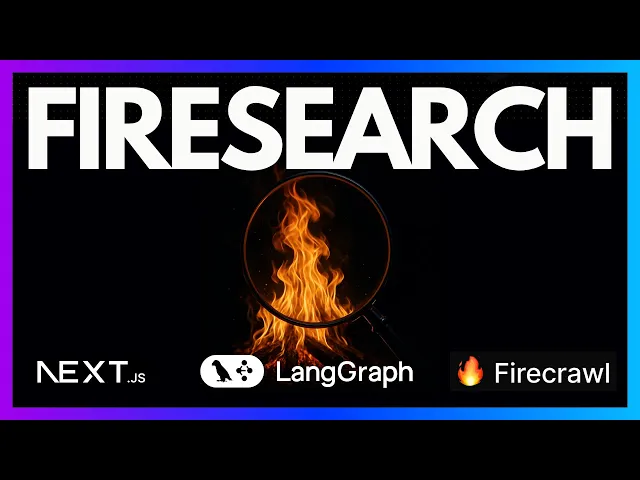FireSearch: An Open-Source Deep Research Template Built with Next.js, Firecrawl and LangGraph

FireSearch builds next-gen research tools for everyone
In a digital landscape where information overload is the norm, efficient research tools have never been more valuable. A recent video on building "FireSearch" – an open-source deep research template – demonstrates how developers can create powerful research applications by combining Next.js, Firecrawl, and LangGraph technologies. This solution promises to democratize advanced search capabilities that were once limited to tech giants with massive resources.
Key insights from the FireSearch approach
-
Architecture simplicity is powerful – FireSearch combines just three main components (Next.js, Firecrawl, LangGraph) to create a sophisticated research engine without unnecessary complexity
-
Local-first development prioritizes privacy – By processing content locally rather than sending everything to external APIs, FireSearch maintains user privacy while still leveraging AI capabilities
-
Flexible, customizable agents – The system uses LangGraph to coordinate specialized AI agents that can be adapted for different research domains and needs
-
Cost-effectiveness through thoughtful design – By intelligently managing token usage and processing content locally when possible, FireSearch dramatically reduces API costs compared to naïve implementations
Why FireSearch matters more than you might think
The most compelling aspect of FireSearch is how it reimagines web research as a collaborative process between specialized AI agents. Rather than treating search as a simple query-response mechanism, this approach creates an interactive system where different AI components handle specific tasks – from generating search queries to evaluating relevance and synthesizing findings.
This matters tremendously in our current information ecosystem. The internet contains vast knowledge, but traditional search engines increasingly prioritize commercial content over genuine information discovery. FireSearch's agent-based approach can potentially restore the internet's promise as a knowledge tool by focusing on depth and relevance rather than engagement metrics.
What the video didn't cover: Real-world applications
One area not explored in the video is how FireSearch could transform specific industries. Take healthcare, for example. Medical professionals constantly need to research rare conditions or treatment protocols across multiple medical databases and journals. A customized FireSearch implementation could create specialized agents trained on medical terminology that could search across PubMed, clinical trial databases, and medical journals simultaneously – synthesizing findings with proper citation and confidence levels.
Similarly, legal researchers could benefit enormously. Law firms spend countless
Recent Videos
How To Earn MONEY With Images (No Bullsh*t)
Smart earnings from your image collection In today's digital economy, passive income streams have become increasingly accessible to creators with various skill sets. A recent YouTube video cuts through the hype to explore legitimate ways photographers, designers, and even casual smartphone users can monetize their image collections. The strategies outlined don't rely on unrealistic promises or complicated schemes—instead, they focus on established marketplaces with proven revenue potential for image creators. Key Points Stock photography platforms like Shutterstock, Adobe Stock, and Getty Images remain viable income sources when you understand their specific requirements and optimize your submissions accordingly. Specialized marketplaces focusing...
Oct 3, 2025New SHAPE SHIFTING AI Robot Is Freaking People Out
Liquid robots will change everything In the quiet labs of Carnegie Mellon University, scientists have created something that feels plucked from science fiction—a magnetic slime robot that can transform between liquid and solid states, slipping through tight spaces before reassembling on the other side. This technology, showcased in a recent YouTube video, represents a significant leap beyond traditional robotics into a realm where machines mimic not just animal movements, but their fundamental physical properties. While the internet might be buzzing with dystopian concerns about "shape-shifting terminators," the reality offers far more promising applications that could revolutionize medicine, rescue operations, and...
Oct 3, 2025How To Do Homeless AI Tiktok Trend (Tiktok Homeless AI Tutorial)
AI homeless trend raises ethical concerns In an era where social media trends evolve faster than we can comprehend them, TikTok's "homeless AI" trend has sparked both creative engagement and serious ethical questions. The trend, which involves using AI to transform ordinary photos into images depicting homelessness, has rapidly gained traction across the platform, with creators eagerly jumping on board to showcase their digital transformations. While the technical process is relatively straightforward, the implications of digitally "becoming homeless" for entertainment deserve careful consideration. The video tutorial provides a step-by-step guide on creating these AI-generated images, explaining how users can transform...
